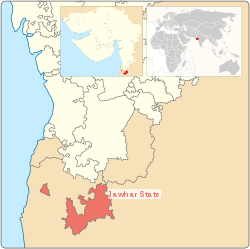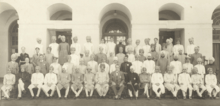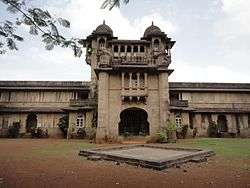Yashwantrao Martandrao Mukne
H. H. Maharaja Shrimant Yashwantraoji Martandraoji Mukne or Maharaja Patang Shahji Mukne (V) (Dada Saheb) (11 December 1917 – 4 June 1978) was the last Koli ruler of Jawhar State in India and later became a politician. He was born in Jawhar.[1][2]


| Yashwantraoji Mukne | |||||||||||||
|---|---|---|---|---|---|---|---|---|---|---|---|---|---|
| Maharajah of Jawhar State | |||||||||||||
 Maharaja Yashwant Raoji seating at fourth chair in second row in the meeting of Chamber of Princes in Delhi, India, 1941 | |||||||||||||
| Coronation | 26 May 1938 | ||||||||||||
| Successor | None | ||||||||||||
| Born | Yashwant Rao 11 December 1917 Jawhar, British India | ||||||||||||
| Died | 4 June 1978 (aged 60) Jawhar, Maharashtra, India | ||||||||||||
| Spouse | Priyamwande Mukne, (Princess Kamala Bai Dafle of Jath State) | ||||||||||||
| Issue | Yuvraj Digvijaysingh Rao Mukne, Princess Asharaje Sahiba, Princess Premaraje Sahba | ||||||||||||
| |||||||||||||
| House | Mukne Dynasty | ||||||||||||
| Father | Maharaja Martand Rao Mukne (Bhau Saheb) | ||||||||||||
| Mother | Maharani Saguna Bai Mukne | ||||||||||||
| Religion | Hindu | ||||||||||||
| Occupation | Flight Lieutenant in Royal Indian Air Force | ||||||||||||
History

Mukne's father, Vikramshah Pantangshah, was Raja of Jawhar, a princely state in the Thane district of what was then Bombay Presidency. A benevolent ruler who served in World War I and was granted a nine-gun salute, he died at the age of 42, around 1928, having succeeded his father as ruler in 1917. He had a son and a daughter,[3] the former of whom succeeded him.
Yashwantrao Martandrao Mukne was too young to assume control at the time of his accession, so his mother, Rajmata Saguna Bai Mukne, acted as regent. When he came of age in 1938, he assumed full ruling powers.
He did good works such as by expanding development activities, encouraging the chemical, paper, textile, dyeing and printing liquor and starch industries. He provided free primary education and medical relief, He ran both middle and high schools, a central library and museum, hospital and maternity home. He provided touring dispensaries for rural areas of state. At the outbreak of World War II, He volunteered for services and served as Flight lieutenant for four years in Royal Indian Air Force.
Jawhar State acceded to the newly independent India in 1947, after which Mukne was no longer ruler and entered politics. As a member of the Indian National Congress, he was elected to the 1st Lok Sabha from the Thane, which was a seat reserved for candidates from the Scheduled Tribes. He was subsequently elected to the 3rd Lok Sabha from Bhiwandi and to the 4th Lok Sabha from Dahanu, which was also a reserved constituency.[4]
Education
Born on 11 December 1917, Mukne was educated at Rajkumar College, Rajkot, and at Old Blundell's School and the Middle Temple in England. He was married to Her Highness Priyamvada Raje, a princess of Jath State, and had one son and two daughters. He lived at Jai Vilas Palace, Jawhar, in Thane district.[4]
References
- Lethbridge, Sir Roper (2005). The Golden Book of India: A Genealogical and Biographical Dictionary of the Ruling Princes, Chiefs, Nobles, and Other Personages, Titled Or Decorated of the Indian Empire. Aakar Books. ISBN 9788187879541.
- Burman, J.J. Roy (1996). "A comparison of sacred groves among the Mahadeo Kolis and Kunbis of Maharashtra". Indian Anthropologist. 26 (1): 37–45. ISSN 0970-0927. JSTOR 41919791.
- "The Rajah of Jawhar". The Times. 11 January 1928. p. 17.
- "Official biographical sketch". Parliament of India website. Retrieved 22 February 2012.